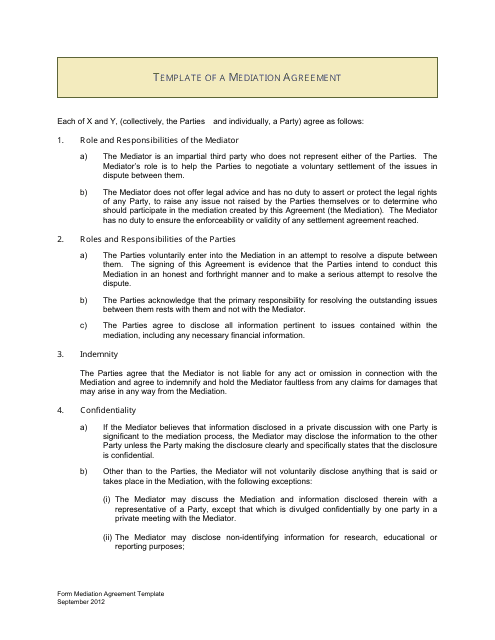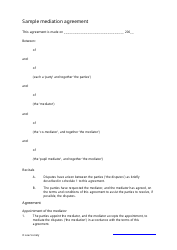Sample Mediation Agreement Template - Five Points
The Sample Mediation Agreement Template - Five Points is used to outline the terms and conditions that parties agree to when they enter into mediation. It helps facilitate the resolution of disputes through a neutral third party.
The parties involved in the mediation, typically the disputing individuals or organizations, file the sample mediation agreement template.
FAQ
Q: What is a mediation agreement?
A: A mediation agreement is a written contract between parties involved in a dispute, outlining the terms and conditions of the mediation process.
Q: Why is a mediation agreement important?
A: A mediation agreement is important because it helps establish the framework for resolving a dispute through mediation, ensuring that all parties are on the same page and have a clear understanding of the process.
Q: What are the key points typically included in a mediation agreement?
A: The key points typically included in a mediation agreement are the names of the parties involved, the mediator's role, the scope of the mediation, confidentiality provisions, and the agreement to participate in good faith.
Q: What is the role of a mediator?
A: A mediator is a neutral third party who helps facilitate communication and negotiation between the parties involved in a dispute. Their role is to assist in finding a mutually acceptable resolution.
Q: What is the scope of the mediation process?
A: The scope of the mediation process refers to the specific issues or topics that will be addressed through mediation. It outlines what can and cannot be discussed and resolved during the mediation sessions.
Q: Why is confidentiality important in mediation?
A: Confidentiality is important in mediation because it creates a safe and protected environment for parties to openly discuss their interests and concerns. It also prevents any information shared during mediation from being used against either party in other legal proceedings.
Q: What does 'participating in good faith' mean in a mediation agreement?
A: Participating in good faith means that all parties involved in the mediation process are committed to engaging in honest and meaningful discussions, respecting each other's perspectives, and working towards a mutually agreeable solution.
Q: Can a mediation agreement be legally binding?
A: Yes, a mediation agreement can be legally binding if all parties sign it and it meets the necessary legal requirements. However, it is always advisable to consult with an attorney to ensure the enforceability of the agreement.
Q: Can a mediation agreement be enforced in court?
A: Yes, a mediation agreement can be enforced in court if it is legally binding and one of the parties fails to comply with its terms. However, the court's enforcement may vary depending on jurisdiction and the specific circumstances of the case.
Q: What happens if parties do not reach a resolution through mediation?
A: If parties do not reach a resolution through mediation, they may explore other options, such as arbitration or litigation, to resolve their dispute. The mediation agreement can serve as a starting point for further negotiations or legal proceedings.





